Your Old Phones Are A ‘Ticking Time Bomb’ for the Environment
Old phones, laptops and tablets, commonly called electronic waste, is an environmental issue with limited solutions.

Most of us can relate to the frustration of a smart phone that starts to glitch after a few years, or a laptop that inexplicably stops working one day.
So what do you do with those things once they stop working? And have you ever thought about it in relation to climate change?
Phones and laptops “are designed with a ticking time bomb. It forces us to buy new devices.” – Ramesh Srinivasan, UCLA
Ramesh Srinivasan is a professor at UCLA and the author of a book related to this subject called, “Beyond The Valley.” He says that the current business model among big tech corporations is intentionally unsustainable.
Click on the player to hear Ramesh Srinivasan talk about planned obsolescence, e-waste and what you can do about it.
You Must Love This Planet
Otherwise, how did you get here? 101.9 WDET wants to connect with metro Detroiters who are concerned about climate change and want to take action. Sign-up to be contacted by our editorial team to learn more.
The Problem
Srinivasan says the devices, such as smartphones, laptops and desktop computers are designed for our consumer use, and “they are designed with a ticking time bomb.”
He notes that within the past couple of years, the problem has become increasingly apparent through companies like Apple, and is clearly a feature of the business model.
“We are locked into consumer patterns of buying one device with an expiration date. It forces us to buy new devices,” he says.
Why It Matters
Srinivasan explains that this planned obsolescence is “deeply problematic on an environmental level, it also creates consumer dependency and locks people into consumption patterns that are not good for our planet.”
Right To Repair: A Movement
In some states there’s discussion around creating a policy that would empower consumers and stimulate the economy through allowing people to fix their phones themselves or by going to a local electronic repair shop.
“Try to think about an economy that benefit[s] consumers who face economic insecurities more and more these days,” says Srinivasan. “As well as benefit our planet where electronic waste is one of the many hidden and largely invisible forms of environmental devastation.”
“Do we want to design devices to die? Or do we want to create sustainability and life cycles that are conscious of people and our planet?” – Ramesh Srinivasan, UCLA
He adds that in terms of the national conversation around Right to Repair, “we are thinking about how to push from a policy-based level for informal and secondary economies to take root.”
Srinivasan explains that if our phones were designed to allow for independent repair it would create room for “small businesses and entrepreneurs of all kinds to partake in the repair and recycling process, it creates more jobs and income for a lot of different folks that could be engaged in the life cycle of technology.”
What Can You Do?
Srinivasan says the first step is making the choice to demand change.
“Do we want to design devices to die? Or do we want to create sustainability and life cycles that are conscious of people and our planet?” he asks. Influencing policy makers in Michigan, or wherever you live, to get on board is another important piece of the equation.
- You can contact your Congressional representatives and Michigan Senators.
- You can also reach out to Apple and other big tech companies to voice your concerns.
- Support local electronic repair shops by taking your broken phone, tablets and laptops in for service. You can also buy refurbished electronics at these shops too.
“We should be supporting Right to Repair legislation. It’s kind of all hands on deck when it comes to this issue.”
“Right now, big tech is unsustainable in many ways and it’s time for us to challenge them to do better,” says Srinivasan.
Support the news you love.
Here at WDET, we strive to make our journalism accessible to everyone. As a non-profit public media institution, we maintain our journalistic integrity through independent support from readers like you. Because you value WDET as your source of news, music, and conversation, please make a gift of support today. Even $5 helps!
